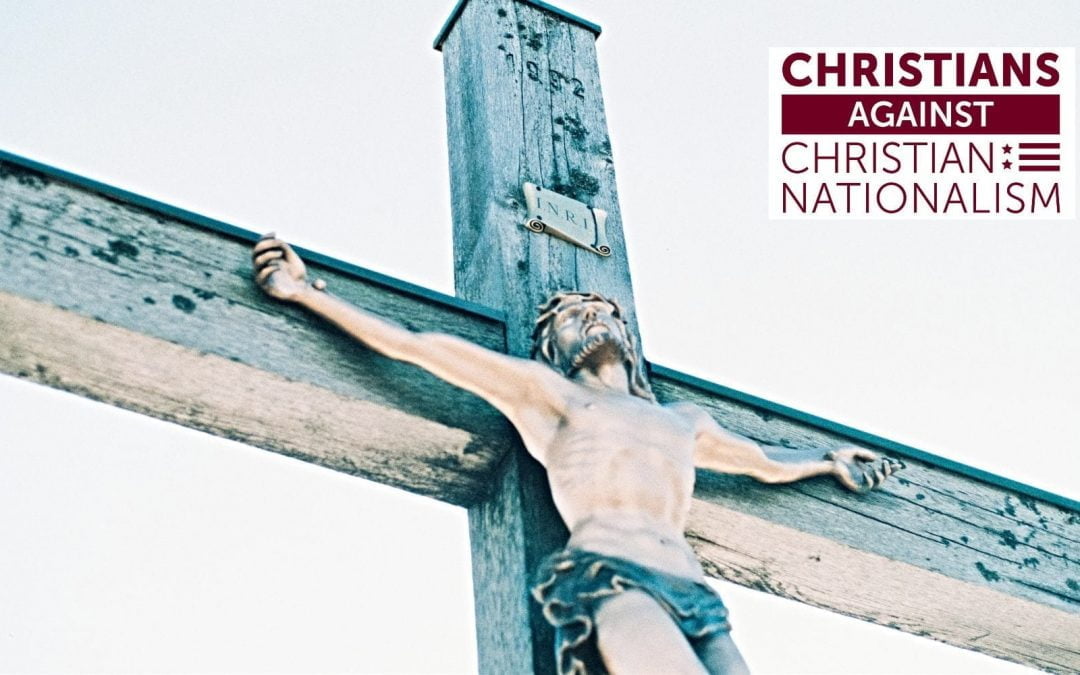Christians are always struggling to overcome the problem of a crucified Christ.
We have an incessant need to clean him off and fix him up. Just Google image search “crucified Christ” to see what I mean.
Not only is he so very white in most of the results, but even on the cross we give him muscles, cover up his nakedness and give his face a serene quality that is so incongruous with crucifixion as to be even more appalling.
The apostles are no different. They flee Jesus at his most vulnerable, and if it weren’t for the women disciples in Luke’s telling, Jesus would be utterly abandoned at the cross.
Even after the crucifixion and resurrection, the disciples still don’t get it. Immediately prior to Jesus’ ascension, they question him asking, “Is now the time when you re-establish the kingdom of Israel?”
Or in modern parlance, “Is now the time for you to make Israel great again?”
They are still trapped in their small nationalism, expecting Jesus to be their military messiah and build a kingdom with a sword.
They ask this of the same man who surrendered to the cross rather than raise a single hand in violence against his torturers.
To be that profoundly misunderstood after suffering so much is to add insult to injury.
It is a perversion of the cross of Christ, but it is a seductive perversion.
In his commentary on Acts in the “Belief: A Theological Commentary on the Bible” series, Willie James Jennings writes, “Nationalist fantasy has seeped into faith both Jewish and Christian and finds its ways into other faiths as well. Such fantasy dreams are completely understandable and quite compelling because they help us cope with the vulnerability that is creaturely life, and they reflect the power of accumulated wounds.”
He continues, “The greater the number of wounds inflicted on a people, the greater the fantasy dreams of being self-determined and wielding power over others, and power to control our own destiny. It drives the creation of walled communities, border patrols and checkpoints and turns violence and segregation into the proper exercise of the state’s right to life.”
The nationalist temptation is to believe that God’s making great of our own nation in particular would be for the good of all other nations in general.
And with that “benevolent” logic, what ill could not be committed in the name of the greater good?
One could even draw a cross, the very symbol of nonviolent resistance, on their shields as they crusade against the infidels of other nations.
Such ways of thinking produce disciples who follow Jesus only because they worship power.
What the disciples don’t yet understand and what “Christian” nationalism fails to recognize is that it is the crucified Christ who reigns and none other. And he reigns just as he lived.
He has not cast aside nonviolence and self-sacrifice to take up subjugation and domination.
To do so would not only be against his character, but also would surrender the power of the cross and all of its authority.
Revelation echoes this truth when Jesus appears for the first time in the throne room not as the lion of Judah, but as a slain lamb with blood stains on his wool coat (see Revelation 5).
Nationalism has no use for a crucified king.
How can a man who worships the slain lamb be convinced to kill for his nation? How can a woman who worships a man whom the state murdered ever be convinced that the state has the right to take life?
In “Preaching in Hitler’s Shadow,” Dean Stroud, professor emeritus of German studies at the University of Wisconsin in LaCrosse, builds a picture of how the Nazi party despised Christianity but pretended otherwise.
Rather than outright opposition, Hitler set out to infiltrate it. On the first Sunday after he was elected, SS officers flooded into churches with their suits on.
In Hitler’s first speeches, he quoted the Bible and prayed for God’s blessing on the German people. Many Christians fell victim to his manipulations.
One of them was a pastor named Martin Niemoller.
Niemoller was a Christian nationalist and pastor who voted for Hitler because of Hitler’s pledge to honor Christianity and to provide Germany with a strong leader who would make Germany great again.
But eventually, even Niemoller saw through the Third Riech’s manipulation and earned himself a seven-year stay in a concentration camp.
There is one quote Niemoller used in sermons and lectures many times in the years after the war.
Today, if you visit the Holocaust museum in Washington, D.C., you’ll find it on the final wall as you exit the exhibit. It is there to help interpret all of the atrocities just witnessed.
“First they came for the socialists, and I did not speak out – because I was not a socialist. Then they came for the trade unionists, and I did not speak out – because I was not a trade unionist. Then they came for the Jews, and I did not speak out – because I was not a Jew. Then they came for me – and there was no one left to speak for me.”
To follow a crucified king is to stand always in solidarity with the vulnerable whether it leads to a cross or a concentration camp trusting that none suffers in vain.
One day our king will make all things right, even death itself.
Editor’s note: This article is adapted from a sermon Topper preached on June 2, 2019, at NorthHaven Church in Norman, Oklahoma. It is part of a series focused on Christians opposing Christian nationalism. It is published in conjunction with the launch of a BJC-led initiative ChristiansAgainstChristianNationalism.org. The previous articles in the series are:
US Christians Speak Out Against Christian Nationalism | EthicsDaily.com staff
Threat of Christian Nationalism Has Reached High Tide | Amanda Tyler
Freedom Fighters: Baptist Defenders of Religious Liberty | Pam Durso
Your Fight Song Against Christian Nationalism: I Won’t Back Down | Brian Kaylor


